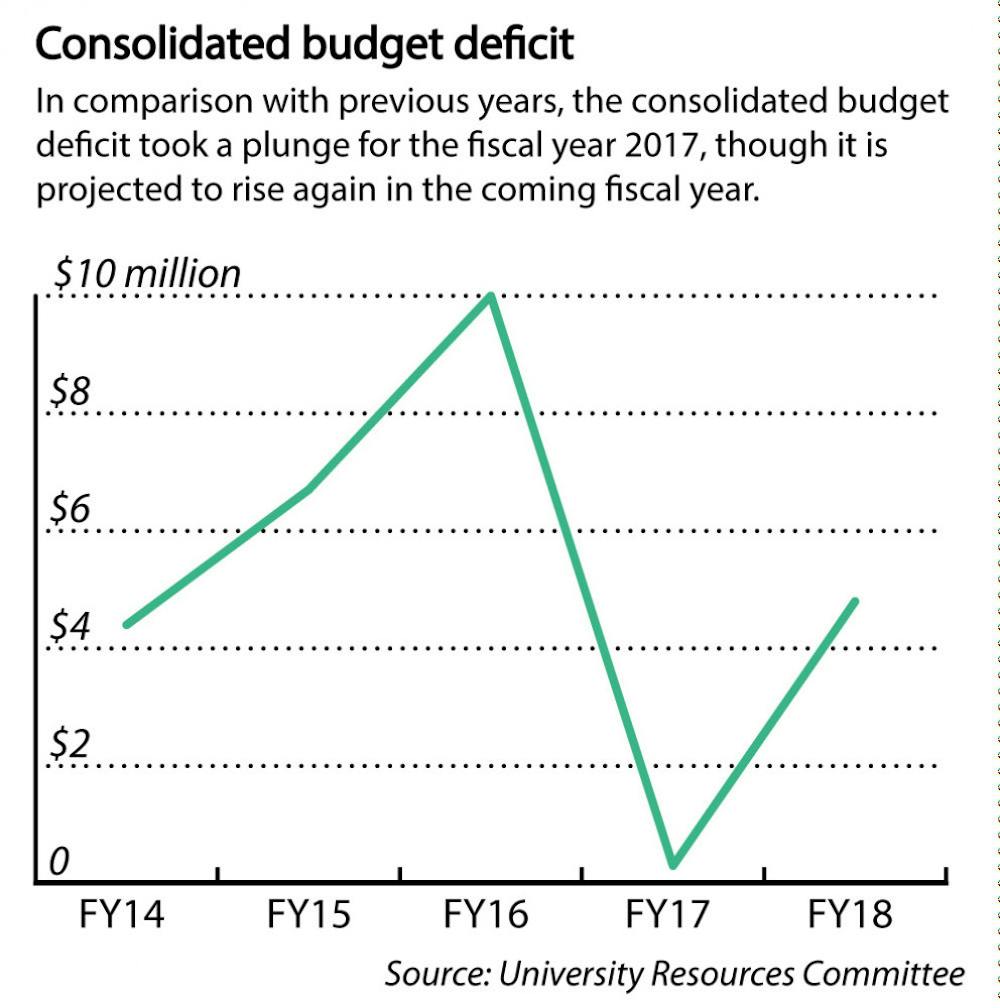The Corporation, the University’s highest governing body, approved the University Resources Committee’s $1.061 billion operating budget plan for fiscal year 2018, including a 4.4 percent increase in undergraduate tuition and fees, wrote President Christina Paxson P’19 in a community-wide email Saturday.
After roughly breaking even in FY17, a major focus of the budget deliberations was the financial sustainability of the University and its endowment, according to the URC’s annual report. Decreasing the endowment payout, or money drawn from the endowment, is one way the University hopes to grow and protect the long-term health of the University, said Provost Richard Locke, who chaired the URC.
The endowment payout to the education and general budget is slated to decrease by $12.7 million from $136.2 million in FY17 to $123.5 million in FY18, a 9.4 percent decrease, according to the report. Funds from the endowment will make up about 16.5 percent of the E&G revenue in FY18 compared to 19.06 percent of revenue in FY17.
It will be tough to absorb this cut, Locke said. The University has to “tighten (its) belt” and “shave down some investments,” such as keeping salary increases low, in order to end up with an overall deficit of $4.8 million, he added. The projected deficit for FY17 is $300,000, according to the URC’s FY17 report.
“If we can grow the endowment, then a bigger income can come from the endowment,” giving the University more freedom to invest in salaries and raise tuition at lower percentages, Locke said.
The URC, which is comprised of students, faculty members, staff members and administrators, strived to prioritize financial aid, academic programs and diversity and inclusion initiatives along with financial sustainability in making its budget, Locke said.
As recommended by the URC’s annual report, the undergraduate tuition and fees will increase to $67,439 in the 2017-18 academic year, up from $64,566 in the 2016-17 academic year. The 4.4 percent increase is consistent with increases in the previous four academic years, which ranged from a 3.8 percent increase for the 2014-15 academic year to a 4.4 percent increase for the 2015-16 academic year, The Herald previously reported.
The University’s tuition rate is “in the middle of the pack” when compared to peer institutions, which is “the right place to be,” Locke said.
Tuition remains the largest source of revenue for the budget at 64 percent of the proposed education and general budget, according to the report.
The budget for financial aid will increase to $122.1 million, up from $120.5 million for FY17, but the University came under budget for financial aid expenditures by about $3 million, Locke said. The actual growth in the financial aid budget is 3.9 percent, according to the report.
The University has been working hard to offer more competitive financial aid packages to middle income families so the University does not lose them to its peers that give more generous packages, Locke added.
Locke said the University will meet the needs of whoever it accepts, “even if it means we have to go over budget.”
The University will also increase graduate student stipends so graduate students in the humanities and social sciences receive the same 12-month stipends as graduate students in science, technology, engineering and mathematics fields, Locke said.
The University will allocate $1.5 million toward implementing the Diversity and Inclusion Action Plan, which includes funding for bringing prospective students from low-income backgrounds to A Day on College Hill, increasing staffing at various centers, hiring a director of diversity and inclusion in the Office of Institutional Diversity and Inclusion and supporting faculty hiring, Paxson wrote.
Salary pools for faculty and staff will increase by 2.75 percent, according to the report. The University recognizes the salary increase is low though it is within the competitive range of salaries offered by peer institutions, Locke said.
The University is “conscientious” of the deficit and strives to eliminate it, said Christian Hanson ’17, one of four undergraduate students selected by the Undergraduate Council of Students to serve on the URC. “But sometimes there are other priorities that need to be funded that have a higher rate of return” than putting money toward reducing the deficit, he said.
For example, the University invested in room fees in response to student complaints that the suite fee was separating friends due to the financial barrier that it posed, Hanson said. Now, there is no difference in fees between a regular room and a suite, he added.
The student representatives on the URC actively solicited feedback from the Brown community in creating this year’s budget plan, Hanson added.
“It’s a strong budget that … incorporates the voices of all the different members of the community,” Locke said.
At its meetings, the Corporation also accepted more than $62 million in gifts and approved plans to begin construction of an expansion building for the Watson Institute for International and Public Affairs and renovations for Wilson Hall. Richard Friedman ’79 P’08 was also elected to serve as the Corporation’s secretary.





